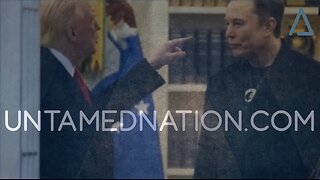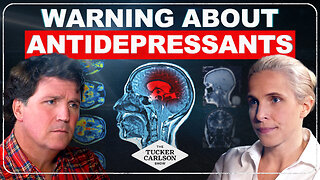Premium Only Content

Episode 1299: The Everlasting Man
"The Everlasting Man" is a book by G.K. Chesterton, published in 1925. It is a work of Christian apologetics and a philosophical exploration of human history and the nature of humanity. Here is a summary of its main ideas:
Chesterton begins by critiquing various theories of human origins, such as evolution and materialism. He argues that these theories fail to provide a satisfactory explanation for the uniqueness and complexity of human beings. According to Chesterton, human beings are distinct from other creatures and possess a sense of wonder, imagination, and the ability to create.
The book then delves into a historical analysis of the development of different civilizations and cultures. Chesterton emphasizes the commonalities found across various cultures, such as the existence of myths, legends, and rituals that point to a shared human experience and a search for meaning.
Chesterton presents Jesus Christ as the central figure in human history, arguing that His life and teachings provide the most compelling explanation for the existence and purpose of humanity. He asserts that Christianity is not merely a religion among many others but the fulfillment of human aspirations and the solution to the human predicament.
Throughout the book, Chesterton explores the themes of religion, philosophy, art, and morality, demonstrating how they are interconnected and how Christianity offers a comprehensive worldview that addresses the deepest questions of human existence.
"The Everlasting Man" is known for its eloquent writing style, wit, and philosophical insights. Chesterton presents his arguments through a combination of historical analysis, literary references, and logical reasoning, making it a thought-provoking and engaging read.
Overall, the book is a defense of Christian faith and a reflection on the eternal nature of humanity, asserting that the answers to life's fundamental questions can be found in the person of Jesus Christ and the Christian worldview.
a summary of the chapters in G.K. Chesterton's "The Everlasting Man":
Chapter 1: Introduction
Chesterton sets the stage for the book by discussing the flaws in various theories of human origins and the need for a different perspective.
Chesterton critiques the prevalent scientific and philosophical theories of his time, such as Darwinian evolution and materialism, arguing that they fail to provide a satisfying explanation for the uniqueness and complexity of human beings. He challenges the idea that humans are simply the result of random chance and natural selection, proposing that there is something distinct and exceptional about humanity that cannot be reduced to purely physical or materialistic explanations.
Chesterton argues that human beings possess qualities such as wonder, imagination, and the ability to create, which set them apart from other creatures. He contends that these qualities cannot be explained solely by evolutionary processes but require a more profound understanding of human nature.
Furthermore, Chesterton asserts that humans have an innate desire to seek meaning and purpose in life. He suggests that this quest for meaning points to a higher reality beyond the physical world and indicates the existence of something transcendent.
In this chapter, Chesterton sets the stage for the exploration of human history and the nature of humanity that follows in the rest of the book. He invites readers to reconsider the prevailing theories of his time and to embrace a broad
Chapter 2: The Riddles of the Gospel
Chesterton examines the uniqueness and mystery of the Christian message, highlighting how it defies conventional expectations and offers a profound understanding of human nature.
Chesterton begins by highlighting the paradoxes and unexpected qualities present in the Gospel narratives. He notes that Jesus Christ, as depicted in the Gospels, defies simplistic categorizations and conventional expectations. Jesus embodies a combination of extraordinary humility and extraordinary authority, a juxtaposition that challenges conventional notions of greatness and power.
Chesterton argues that the Christian message disrupts the prevailing assumptions of his time regarding religion, philosophy, and social order. He suggests that Christianity introduces a unique and counterintuitive understanding of the world and human nature. Chesterton contends that the Gospels present a worldview that encompasses both the material and the spiritual aspects of existence, addressing the profound questions of human existence and purpose.
Moreover, Chesterton emphasizes the role of paradox in the Gospel narratives. He argues that the apparent contradictions found in the life and teachings of Jesus are not inconsistencies but rather complementary truths that point to a deeper reality. He suggests that the paradoxes of the Gospel narratives are an essential part of their transformative power and the challenge they pose to human wisdom.
Chesterton also explores the idea that Jesus represents the ultimate fulfillment of human aspirations. He contends that Jesus' life, death, and resurrection provide a profound answer to the fundamental human longing for meaning, redemption, and the resolution of the human predicament.
In this chapter, Chesterton invites readers to engage with the mysteries and riddles presented in the Gospels. He highlights the uniqueness and transformative potential of the Christian message, challenging conventional thinking and inviting readers to consider the profound truths contained within the paradoxes of the Gospel narratives.
Chapter 3: The Antiquity of Civilization
Chesterton explores the commonalities among ancient civilizations and their shared search for meaning through myths and rituals.
Chesterton begins by acknowledging the vast differences among ancient civilizations in terms of language, culture, and geography. However, he argues that beneath these surface variations, there are deeper similarities that indicate a common human nature and a collective quest for understanding.
Chesterton examines the presence of myths and rituals in ancient cultures, asserting that these elements are universal and arise from a common human longing for transcendence and a desire to make sense of the world. He suggests that myths and rituals, though expressed differently in various civilizations, contain echoes of profound truths about human existence.
Furthermore, Chesterton emphasizes that the myths and rituals of ancient cultures often revolve around significant themes such as creation, the divine, and the struggle between good and evil. He contends that these recurring motifs point to a shared human consciousness that seeks to make sense of the mysteries of life and to find meaning in the face of its challenges.
Chesterton argues that the prevalence of these common themes across different civilizations supports the idea that there is a universal narrative embedded within human history. He suggests that this narrative reflects a deeper reality and indicates that humanity is engaged in an ongoing quest for understanding and fulfillment.
In this chapter, Chesterton invites readers to consider the broader context of human civilization and to recognize the common threads that connect ancient cultures. He suggests that these shared experiences and yearnings reveal something profound about human nature and the universal search for meaning and purpose. By exploring the antiquity of civilization, Chesterton underscores the timeless and enduring aspects of human existence and the perennial questions that have occupied humanity throughout history.
Chapter 4: God and Comparative Religion
Chesterton discusses the prevalence of religious beliefs across different cultures and argues for the uniqueness and coherence of Christianity.
Chesterton begins by acknowledging the existence of various religious beliefs throughout history and across different societies. He recognizes the diversity of religious expressions and rituals, but he contends that beneath this diversity, there is a common longing for the divine and a universal recognition of the existence of something beyond the material world.
Chesterton argues against the notion that all religions are essentially the same or that they are mere cultural constructs with no inherent truth. He asserts that there are fundamental differences in the nature and character of different religious systems, and these differences have significant implications for understanding the human condition.
Chesterton proposes that Christianity stands apart from other religions in its unique and profound understanding of God. He asserts that Christianity presents a coherent and comprehensive view of the divine that addresses the deepest questions of human existence. According to Chesterton, Christianity provides an answer to the problem of evil, the nature of humanity, and the ultimate destiny of the universe.
Furthermore, Chesterton argues that Christianity uniquely combines both the transcendent and the immanent aspects of God. He suggests that while other religions may focus on one aspect or the other, Christianity holds the paradoxical belief that God is both intimately involved in creation and yet beyond it.
In this chapter, Chesterton invites readers to examine the diversity of religious beliefs and to recognize the distinctiveness of Christianity. He emphasizes that Christianity offers a comprehensive worldview that provides meaningful answers to the fundamental questions of human existence. By exploring the relationship between God and comparative religion, Chesterton underscores the uniqueness and coherence of the Christian faith in the broader context of religious diversity.
Chapter 5: Man and Mythologies
Chesterton analyzes the myths and legends found in various cultures, demonstrating their underlying truths and pointing to the existence of a divine pattern in human history.
Chesterton begins by acknowledging the prevalence of myths and legends across different civilizations. He suggests that these stories, often dismissed as mere fictions or primitive superstitions, contain deep-seated truths about human nature, the human condition, and the search for meaning.
Chesterton argues that myths and legends arise from the collective human imagination, which has a profound understanding of universal themes and archetypes. He contends that myths are not mere inventions but rather symbolic representations of essential truths that resonate with the human soul.
Moreover, Chesterton suggests that myths often contain echoes of a greater narrative, a divine pattern that transcends individual cultures. He asserts that despite the cultural variations in mythologies, there are recurring motifs and archetypal characters that reflect a shared human experience and a common search for truth.
Chesterton argues that the prevalence of these mythological patterns throughout history suggests a deeper reality beyond the material world. He contends that the myths of different cultures, when properly understood, can provide insights into the nature of humanity, the existence of a higher power, and the fundamental questions of life.
In this chapter, Chesterton invites readers to explore the richness and symbolism of myths and legends. He suggests that these stories contain profound truths and reveal a deep longing within the human heart for transcendence and meaning. By examining the relationship between man and mythologies, Chesterton highlights the enduring relevance of these ancient narratives and their role in shaping our understanding of the human experience.
Chapter 6: The Demons and the Philosophers
Chesterton contrasts the pagan worldviews of ancient Greece and Rome with the Christian understanding of evil, highlighting the limitations and contradictions of philosophical systems.
Chesterton begins by examining the ancient pagan beliefs surrounding the existence of demons and evil spirits. He suggests that these beliefs, while often dismissed by modern skeptics, indicate an intuitive recognition of the reality of evil in the world. Chesterton argues that the pagan acknowledgment of evil reflects a deeper understanding of the human condition and the presence of spiritual forces beyond the material realm.
Furthermore, Chesterton turns his attention to the philosophical systems of ancient Greece and Rome, particularly the schools of thought that sought to explain the nature of evil. He critiques these philosophical systems, asserting that they often failed to provide satisfactory explanations for the existence of evil or to offer effective solutions for its eradication.
Chesterton contrasts the Greek and Roman philosophers' attempts to rationalize evil with the Christian understanding of evil as a real and active force in the world. He argues that Christianity provides a more profound and coherent explanation for the existence and nature of evil, acknowledging its reality while offering the hope of redemption and victory over it.
Moreover, Chesterton highlights the moral contradictions found within the pagan philosophies, noting that while they aimed to establish ethical systems, they often fell short due to their incomplete understanding of the human condition. He suggests that these philosophies lacked the necessary foundation of divine revelation and grace to truly address the problem of evil and provide a solid ethical framework.
In this chapter, Chesterton invites readers to reconsider the ancient pagan beliefs surrounding evil and to recognize the limitations of purely rationalistic philosophical systems. He presents Christianity as a more comprehensive and compelling response to the problem of evil, grounded in the acknowledgment of its reality and offering a transformative solution through the person of Christ.
Chapter 7: The War of the Gods and Demons
Chesterton explores the concept of divine conflict, contrasting the Christian perspective with the mythologies of ancient civilizations.
Chesterton begins by examining the widespread presence of myths and legends depicting conflicts between gods and demons in various ancient cultures. He suggests that these mythological narratives reflect a deep understanding of the cosmic struggle between good and evil, often personified in the form of deities or supernatural beings.
Chesterton argues that these mythological stories, despite their diverse cultural expressions, share a common theme: the existence of a cosmic battle between the forces of light and darkness, virtue and vice, order and chaos. He suggests that these myths reflect a fundamental human intuition about the ongoing struggle between good and evil in the world.
Furthermore, Chesterton contrasts the mythological accounts of divine conflict with the Christian understanding of the battle between God and the forces of evil. He presents Christianity as a unique and comprehensive explanation for the existence of evil and its ultimate defeat. According to Chesterton, Christianity affirms that evil is not an inherent part of creation but a distortion of the good, brought about by the rebellion of spiritual beings.
Chesterton emphasizes that Christianity portrays the ultimate victory of good over evil through the redemptive work of Jesus Christ. He contends that Christianity offers a coherent and satisfying resolution to the cosmic struggle, providing hope and restoration through the transformative power of God's love.
In this chapter, Chesterton invites readers to contemplate the significance of divine conflict as depicted in myths and legends. He underscores the Christian perspective on this struggle, emphasizing the triumph of good over evil through Christ's redemptive sacrifice. By exploring the war of the gods and demons, Chesterton highlights the universal recognition of a cosmic battle and presents Christianity as the ultimate fulfillment of humanity's longing for deliverance and restoration.
Chapter 8: The End of the World
Chesterton reflects on the apocalyptic themes found in different cultures and presents Christianity as the ultimate fulfillment of human aspirations.
Chesterton begins by acknowledging the presence of apocalyptic beliefs and prophecies in various ancient civilizations. He suggests that these eschatological ideas, which envision the end of the world and a final reckoning, indicate a shared human longing for a resolution to the conflicts and injustices of the present age.
Chesterton explores the apocalyptic themes in ancient mythologies and suggests that they often convey a sense of hope and renewal, pointing towards a future restoration of order and justice. He argues that these mythological narratives, while perhaps distorted or fragmented, reflect a deep human intuition that there is an ultimate purpose and meaning to history.
Furthermore, Chesterton contrasts the ancient pagan apocalyptic visions with the Christian understanding of the end times. He contends that Christianity offers a more comprehensive and satisfying explanation for the ultimate destiny of humanity and the cosmos. According to Chesterton, Christianity teaches that history has a purpose and a culmination in the final judgment and the establishment of God's kingdom on earth.
Chesterton emphasizes that Christianity offers the hope of redemption and transformation, not only on an individual level but also for the entire world. He presents Christianity as the ultimate fulfillment of the human longing for justice, peace, and the resolution of all conflicts.
In this chapter, Chesterton invites readers to reflect on the apocalyptic themes found in different cultures and to consider the unique perspective offered by Christianity. He highlights Christianity's portrayal of the end of the world as a transformative event that brings about the ultimate triumph of good over evil and the fulfillment of human aspirations. By exploring the theme of the end of the world, Chesterton underscores the profound hope and purpose embedded within Christian eschatology.
Chapter 9: Conclusion
Chesterton concludes the book by summarizing his arguments and reiterating the central role of Jesus Christ in human history and the search for truth.
Chesterton begins by reaffirming the central thesis of the book, which is that human beings are unique and distinct from the rest of creation. He asserts that humans possess qualities such as reason, imagination, and moral conscience that set them apart and indicate a special place in the cosmic order.
Chesterton emphasizes that the uniqueness of humanity is not adequately explained by purely materialistic or evolutionary theories. He suggests that there is a mystery and grandeur to human existence that necessitates a broader understanding beyond the confines of scientific analysis.
Moreover, Chesterton reflects on the role of mythology and religion in human history. He argues that myths, while often dismissed as mere superstitions, contain profound truths about the human condition and the search for meaning. Chesterton suggests that Christianity, with its rich mythological and historical narratives, provides the most comprehensive and transformative understanding of the human story.
Chesterton concludes by affirming the enduring relevance and significance of Christianity. He contends that Christianity offers a comprehensive worldview that addresses the deepest questions of human existence, provides moral guidance, and offers hope and redemption through the person of Jesus Christ.
In this final chapter, Chesterton brings together the threads of his argument, highlighting the uniqueness of humanity, the significance of mythologies and religions, and the preeminence of Christianity as the ultimate fulfillment of human aspirations. He invites readers to embrace a broader perspective that acknowledges the mysteries and complexities of human existence and to consider the transformative power of the Christian message.
Overall, the conclusion serves as a fitting end to "The Everlasting Man," encapsulating the main ideas presented in the book and inviting readers to engage with the profound questions and truths it explores.
These chapter summaries provide a general overview of the main ideas discussed in each section of "The Everlasting Man."
-
 LIVE
LIVE
Nerdrotic
2 hours agoDisney LAYOFFS | White Black Panther | Disney Star Wars is Dumb
10,464 watching -
 DVR
DVR
vivafrei
3 hours agoLive with Sam Cooper! Mexican Cartels Making Drugs in Canada? Elon Musk Feud FALLOUT! & More!
69.7K8 -
 LIVE
LIVE
Pop Culture Crisis
2 hours agoJonathan Joss Investigation Update, Mar-a-Lago Face, Kylie Jenner Promotes Plastic Surgery | Ep. 851
619 watching -
 LIVE
LIVE
Untamed Nation
41 minutes agoTRUMP - ELON AFTERMATH: WHAT HAPPENED WHILE NO ONE WAS WATCHING? 6 JUNE 2025
821 watching -
 2:21:34
2:21:34
Tucker Carlson
5 hours agoLaura Delano: The Dark Truth About Antidepressants, SSRIs, and the Psychiatrists Lying for Profit
99.3K66 -
 LIVE
LIVE
Barry Cunningham
4 hours agoDONALD TRUMP IS PRESIDENT OF THE UNITED STATES AND ELON MUSK IS NOT! NOTHING ELSE MATTERS!
1,050 watching -
 1:05:29
1:05:29
Crypto Power Hour
9 hours ago $0.88 earnedBitcoin VS Crypto Mining
17.5K3 -
 1:05:50
1:05:50
Jeff Ahern
2 hours ago $1.14 earnedFriday Freak Out with Jeff Ahern
18.4K3 -
 LIVE
LIVE
SportsPicks
6 hours agoCrick's Corner: Episode 32
58 watching -
 1:15:35
1:15:35
The Quartering
4 hours agoMAGA CIVIL WAR!
61.2K18